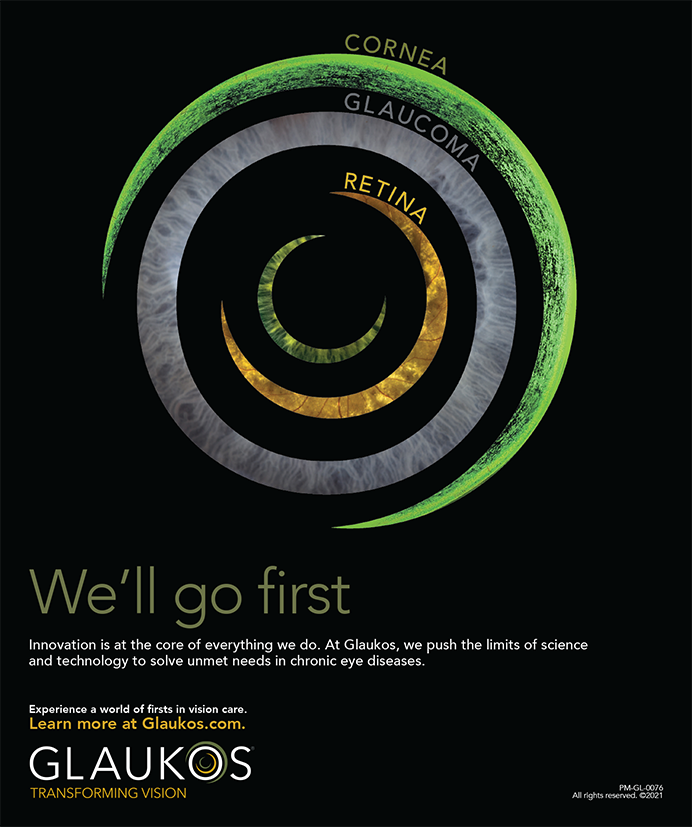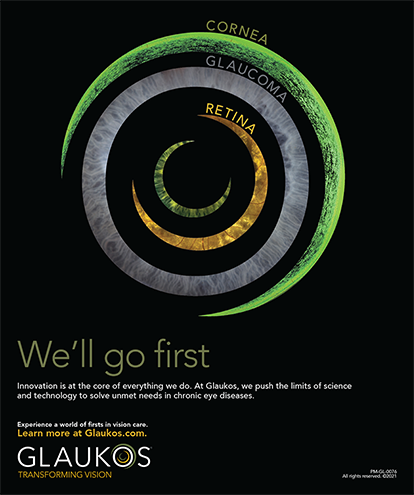
Association Between Visual Impairment and Decline in Cognitive Function in a Multiethnic Asian Population
Lim ZW, Chee ML, Soh ZD, et al1
Industry support: None
ABSTRACT SUMMARY
Previous cross-sectional studies have suggested an association between visual impairment and cognitive decline. The results of the few longitudinal reports that have examined this association have been inconclusive. Moreover, none was performed in Asian populations. To address this gap in the literature, Lim and colleagues investigated the association between visual impairment and a decline in cognitive function over time in a multiethnic Asian population.
The population-based, prospective cohort study enrolled 2,478 individuals who were at least 60 years of age at baseline (mean age, 67.6 years). Of these, 1,256 (50.7%) were male. Participants were Chinese (n = 1,073), Indian (n = 768), or Malay (n = 637).
Study in Brief
In a population-based cohort study of 2,478 elderly Asian individuals, visual impairment at baseline and/or a deterioration in vision over time was associated with a decline in cognitive function over 6 years. The main causes of visual impairment among affected individuals were undercorrected refractive error and cataract.
WHY IT MATTERS
Early intervention for or the prevention of visual impairment in elderly individuals could mitigate a decline in their cognitive function.
All participants were recruited from the Singapore Epidemiology of Eye Diseases (SEED) study, which comprises three prior studies: the Singapore Malay Eye Study (SIMES, 2004–2006), the Singapore Indian Eye Study (SINDI, 2007–2009), and the Singapore Chinese Eye Study (SCES; 2009–2011). Eligible participants were reexamined after 6 years (2011–2013 for SIMES, 2013–2015 for SINDI, and 2015–2017 for SCES).
Visual impairment was defined as a presenting visual acuity worse than 20/40 in the better-seeing eye. Cognitive function was assessed using a 10-question Abbreviated Mental Test (AMT) modified for Singaporean patients and validated in prior population studies. The change in AMT score over time was calculated as the AMT score at the 6-year follow-up visit less the AMT score at the baseline visit. The association between baseline visual impairment and the change in AMT score was determined with a multivariable linear regression model adjusted for multiple sociodemographic factors and various underlying medical conditions.
During the 6-year study period, 489 (19.7%) individuals experienced a reduction in their AMT score. Baseline visual impairment was associated with a decrease in AMT score over 6 years (beta = -0.27; 95% CI, -0.37 to -0.17; P < .001). The association was particularly strong among individuals who were blind (VA ≤ 20/200) compared with individuals who had low vision (VA < 20/40 but > 20/200) based on the better-seeing eye (beta = -1.07 vs -0.25).
When changes in vision were evaluated, static or worsening visual impairment was associated with a decrease in AMT score over the 6 years of the study (beta = -0.29; 95% CI, -0.40 to -0.18; P < .001). In the group of participants with baseline visual impairment who experienced a substantial decrease in AMT score of 3 units or more over the 6-year period (n = 31), the leading causes of change were undercorrected refractive error (n = 14 [45.2%]) and cataract (n = 11 [35.5%]).
DISCUSSION
The study found a 6-year longitudinal association between presenting visual impairment and a decline in cognitive function. Additionally, individuals who remained visually impaired or developed a visual impairment during the 6 years of the study experienced a greater magnitude of decline in cognitive function. Causes of visual loss in these individuals were mostly preventable, which suggests that preserving good vision may be an important public health intervention for mitigating cognitive decline.
The strengths of the study include its large size and the multiethnic Asian composition of its population. The long follow-up period also gave investigators sufficient time to detect the slow and progressive development of cognitive decline.
A limitation of the study is that, although the observed associations were statistically significant, the actual magnitude of the effect estimates was small. Furthermore, the AMT is primarily a screening test for cognitive decline, so additional research is required to validate the association between visual impairment and formally diagnosed cognitive decline or dementia.
Association Between Cataract Extraction and Development of Dementia
Lee CS, Gibbons LE, Lee AY, et al2
Industry support: None for the study itself. A.Y. Lee, Grant support (Carl Zeiss Meditec, Novartis, Regeneron, Santen), Personal fees (Genetech/Roche, Johnson & Johnson Vision, Topcon, Verana Health), Nonfinancial support (Microsoft, Nvidia); E.B. Larson, Royalties (UpToDate)
ABSTRACT SUMMARY
Investigators sought to determine whether cataract extraction is associated with a reduced risk of dementia among older adults. They analyzed data from the Adult Changes in Thought (ACT) study, an ongoing, population-based cohort of randomly selected, cognitively normal members of Kaiser Permanente Washington. Study participants were at least 65 years of age and free of dementia at enrollment. They underwent dementia screening biennially until incident dementia (all-cause, Alzheimer disease, or Alzheimer disease and related dementia) was diagnosed. For their analysis, Lee and colleagues included only participants who had a diagnosis of cataract or glaucoma before enrollment in the ACT or during follow-up. A total of 3,038 participants were included.
Study in Brief
A cohort study assessed 3,038 adults who were at least 65 years of age and enrolled in the Adult Changes in Thought study. After controlling for numerous additional risks, investigators found that participants who underwent cataract extraction had a lower risk of developing dementia than those who did not have cataract surgery. In contrast, no difference was found in the risk of dementia between participants who did and did not undergo glaucoma surgery, which does not restore vision.
WHY IT MATTERS
This study suggests that cataract extraction is associated with a lower risk of developing dementia among adults who are 65 years of age or older. Given that there are currently no effective treatments for dementia, any intervention that can delay the onset or reduce the risk of dementia would be important to public health.
Data on the diagnosis of cataract or glaucoma and any subsequent surgery were extracted from electronic medical records (EMRs). A detailed list of dementia-related risk factors and health-related variables were obtained from study visit data and EMRs. The primary outcome was a clinical diagnosis of dementia, as defined by criteria from the fourth edition of the Diagnostic and Statistical Manual of Mental Disorders. Multivariate Cox proportional hazards regression analyses were conducted with the primary outcome. To address potential healthy patient bias (ie, that patients who underwent cataract surgery were healthier and hence less prone to dementia), the association of dementia with glaucoma surgery, which does not restore vision, was evaluated in the same group.
Among all of the participants, the mean age at first cataract diagnosis was 74.4 years. There were 1,800 (59%) women. In terms of race and ethnicity, 2,752 (91%) identified as White.
Based on 23,554 person-years of follow-up and after controlling for an extensive list of potential confounders, cataract extraction was associated with a significantly reduced risk (hazard ratio, 0.71; 95% CI, 0.62–0.83; P < .001) of dementia compared with participants who did not receive cataract surgery. Glaucoma surgery did not have a significant association with dementia risk (hazard ratio, 1.08; 95% CI, 0.75–1.56; P = .68). Similar results were found with the development of Alzheimer disease.
DISCUSSION
Dementia affects nearly 50 million people worldwide, and no effective treatments exist.3 Efforts to reduce the risk of dementia or delay its onset are becoming increasingly important.Dementia and visual impairment are both strongly associated with aging.4 If interventions to improve or reverse visual impairment can reduce dementia risk, this would have important implications for individual and global public health.
Several studies have shown an association between sensory impairment and cognitive decline.1,5,6 Sensory impairment may contribute to social isolation and decreased cognitive stimulation, which may increase the risk of dementia.3 There are conflicting results, however, regarding the association between cataract extraction and dementia. Lee et al suggest that one reason may be that earlier studies have not used research-quality dementia identification, which is one of the many strengths of their current study. Another strength is its rigorous study of healthy patient bias and potential confounders—rigor that included the use of glaucoma surgery as a negative control.
One potential limitation of the study is that cataract diagnosis and surgery were based on diagnosis and procedure codes extracted from EMRs. Second, clinical data such as visual acuity and cataract severity were not available. Third, the study included only each participant’s first cataract surgery, so the impact of second-eye surgery on the dementia risk was not investigated.
1. Lim ZW, Chee ML, Soh ZD, et al. Association between visual impairment and decline in cognitive function in a multiethnic Asian population. JAMA Netw Open. 2020;3(4):e203560.
2. Lee CS, Gibbons LE, Lee AY, et al. Association between cataract extraction and development of dementia. JAMA Intern Med. 2022;182(2):134-141.
3. Livingston G, Huntley J, Sommerlad A, et al. Dementia prevention, intervention, and care: 2020 report of the Lancet Commission. Lancet. 2020;396(10248):413-446.
4. Brenowitz WD, Kaup AR, Lin FR, Yaffe K. Multiple sensory impairment is associated with increased risk of dementia among Black and White older adults. J Gerontol A Biol Sci Med Sci. 2019;74(6):890-896.
5. Loughrey DG, Kelly ME, Kelley GA, Brennan S, Lawlor BA. Association of age-related hearing loss with cognitive function, cognitive impairment, and dementia: a systematic review and meta-analysis. JAMA Otolaryngol Head Neck Surg. 2018;144(2):115-126.
6. Uhlmann RF, Larson EB, Rees TS, Koepsell TD, Duckert LG. Relationship of hearing impairment to dementia and cognitive dysfunction in older adults. JAMA. 1989;261(13):1916-1919.




